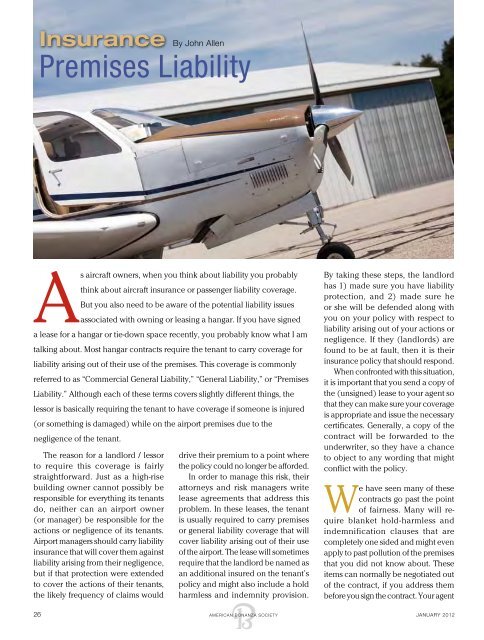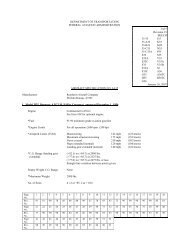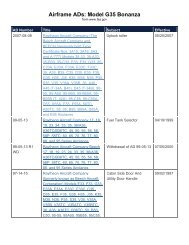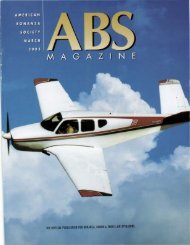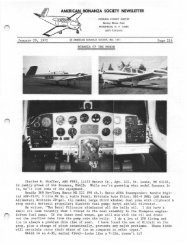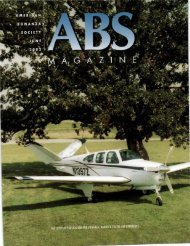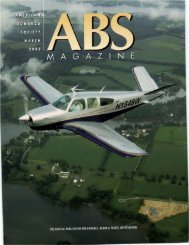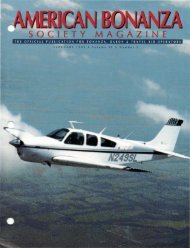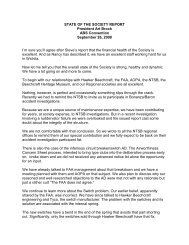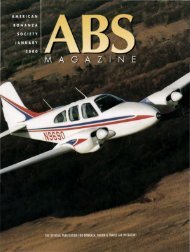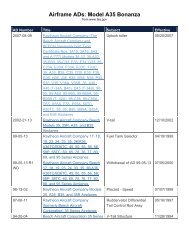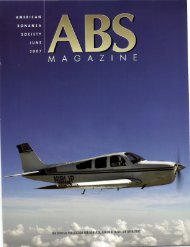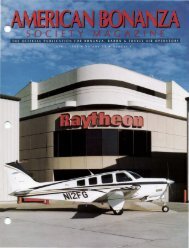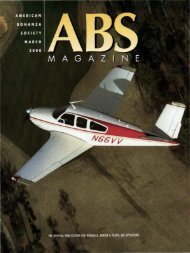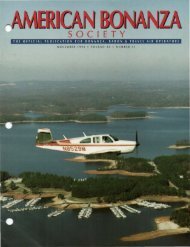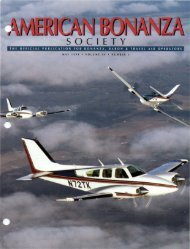A New Way of Flight Training⦠- American Bonanza Society
A New Way of Flight Training⦠- American Bonanza Society
A New Way of Flight Training⦠- American Bonanza Society
Create successful ePaper yourself
Turn your PDF publications into a flip-book with our unique Google optimized e-Paper software.
Insurance By John Allen<br />
Premises Liability<br />
As aircraft owners, when you think about liability you probably<br />
think about aircraft insurance or passenger liability coverage.<br />
But you also need to be aware <strong>of</strong> the potential liability issues<br />
associated with owning or leasing a hangar. If you have signed<br />
a lease for a hangar or tie-down space recently, you probably know what I am<br />
talking about. Most hangar contracts require the tenant to carry coverage for<br />
liability arising out <strong>of</strong> their use <strong>of</strong> the premises. This coverage is commonly<br />
referred to as “Commercial General Liability,” “General Liability,” or “Premises<br />
Liability.” Although each <strong>of</strong> these terms covers slightly different things, the<br />
lessor is basically requiring the tenant to have coverage if someone is injured<br />
(or something is damaged) while on the airport premises due to the<br />
negligence <strong>of</strong> the tenant.<br />
The reason for a landlord / lessor<br />
to require this coverage is fairly<br />
straightforward. Just as a high-rise<br />
building owner cannot possibly be<br />
responsible for everything its tenants<br />
do, neither can an airport owner<br />
(or manager) be responsible for the<br />
actions or negligence <strong>of</strong> its tenants.<br />
Airport managers should carry liability<br />
insurance that will cover them against<br />
liability arising from their negligence,<br />
but if that protection were extended<br />
to cover the actions <strong>of</strong> their tenants,<br />
the likely frequency <strong>of</strong> claims would<br />
drive their premium to a point where<br />
the policy could no longer be afforded.<br />
In order to manage this risk, their<br />
attorneys and risk managers write<br />
lease agreements that address this<br />
problem. In these leases, the tenant<br />
is usually required to carry premises<br />
or general liability coverage that will<br />
cover liability arising out <strong>of</strong> their use<br />
<strong>of</strong> the airport. The lease will sometimes<br />
require that the landlord be named as<br />
an additional insured on the tenant’s<br />
policy and might also include a hold<br />
harmless and indemnity provision.<br />
By taking these steps, the landlord<br />
has 1) made sure you have liability<br />
protection, and 2) made sure he<br />
or she will be defended along with<br />
you on your policy with respect to<br />
liability arising out <strong>of</strong> your actions or<br />
negligence. If they (landlords) are<br />
found to be at fault, then it is their<br />
insurance policy that should respond.<br />
When confronted with this situation,<br />
it is important that you send a copy <strong>of</strong><br />
the (unsigned) lease to your agent so<br />
that they can make sure your coverage<br />
is appropriate and issue the necessary<br />
certificates. Generally, a copy <strong>of</strong> the<br />
contract will be forwarded to the<br />
underwriter, so they have a chance<br />
to object to any wording that might<br />
conflict with the policy.<br />
We have seen many <strong>of</strong> these<br />
contracts go past the point<br />
<strong>of</strong> fairness. Many will require<br />
blanket hold-harmless and<br />
indemnification clauses that are<br />
completely one sided and might even<br />
apply to past pollution <strong>of</strong> the premises<br />
that you did not know about. These<br />
items can normally be negotiated out<br />
<strong>of</strong> the contract, if you address them<br />
before you sign the contract. Your agent<br />
26 AMERICAN BONANZA SOCIETY JANUARY 2012


